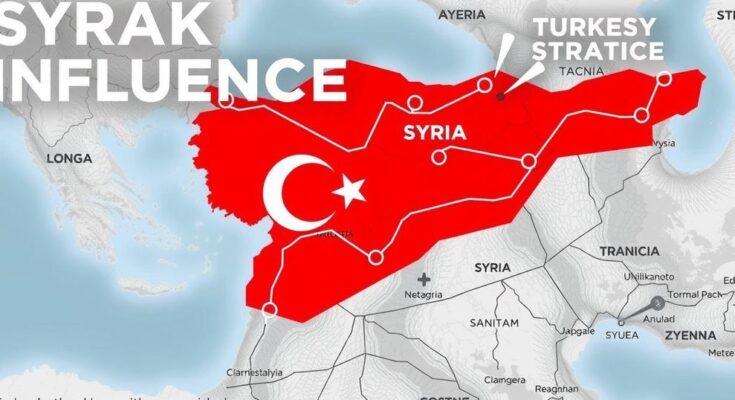Following the departure of Syrian President Assad, Turkey swiftly raised its flag in Damascus, signaling its reinvigorated presence in Syria. Led by intelligence chief Ibrahim Kalin, Turkey’s engagement marks a strategic shift that has seen Ankara gaining influence in a post-Assad Syria, balancing domestic politics on refugees while supporting groups like HTS and asserting its role in the region’s reconstruction.
In the wake of Syrian President Bashar al-Assad’s flight to Moscow, Turkey has swiftly positioned itself as a key player in the evolving political landscape of Syria. Shortly after Assad’s departure, Turkish officials entered Damascus and displayed their national flag for the first time in over a decade. This significant moment followed a visit by Turkey’s intelligence chief, Ibrahim Kalin, who was escorted by the leader of Hayat Tahrir al-Sham (HTS), Ahmed al-Sharaa. Khalifa, from the International Crisis Group, suggests this proactive engagement reflects Turkey’s strategic positioning and advantages arising from the regime change in Syria.
Turkey’s calculated actions in supporting HTS and delaying their offensive demonstrate a strategic approach to leverage new opportunities following Assad’s regime collapse. Erdoğan’s efforts to negotiate with Russia and Iran to bring Assad to the table were unsuccessful, resulting in escalated military maneuvers by HTS against remaining Assad forces. Khalifa notes that Ankara did not foresee the extent of HTS’s expansion, emphasizing that Turkey intentionally overlooked HTS’s intentions during the buildup.
Despite the surprise success of the insurgency, it created unexpected diplomatic pathways for Turkey regarding its foreign policy and domestic positioning, according to Gönül Tol of the Middle East Institute. Erdoğan’s domestic balancing act involving public sentiment towards Syrian refugees has been reinforced by the regime’s fall, allowing him to reframe his policy and appeal to various factions within Turkey.
Tensions between national interests and humanitarian considerations are now being addressed as Turkish officials promise the repatriation of Syrian refugees, which has resulted in movement across the border in the days following Assad’s fall. The economic opportunities presented by the devastation in Syria, paired with promises from Turkish companies to assist in reconstruction, further strengthen Ankara’s footprint in the region.
Moreover, Turkey is expanding its influence through military operations in northern Syria, moving against US-backed Kurdish forces while simultaneously navigating the remnants of the HTS strategically. Turkish officials have expressed intentions to ensure that any Kurdish representation within the new Syrian order remains subordinate to Ankara’s interests, effectively preventing any autonomous governance in the northeast.
The post-Assad era presents a substantial influence for Turkey within Syria, allowing HTS to leverage their relationship with Ankara in securing international recognition and access to necessary resources for reconstruction. As the dynamics unfold, Turkey appears poised to play a crucial role in shaping Syria’s future, assisting both in the rebuilding process and influencing the political landscape.
The article discusses the aftermath of Bashar al-Assad’s ousting as the Syrian president and the subsequent actions taken by Turkey, particularly under President Recep Tayyip Erdoğan. It highlights Turkey’s rapid establishment of diplomatic relations with the newly formed Syrian government and the strategic maneuvers involving the militant group Hayat Tahrir al-Sham (HTS). The piece underscores the geopolitical shifts in northeastern Syria, Turkish domestic policies regarding refugees, and Turkey’s economic ambitions in the reconstruction of the war-torn nation.
In conclusion, Turkey’s adaptive strategies in the wake of the Assad regime’s collapse have positioned it advantageously within a shifting Syrian landscape. The engagement with HTS, promises of refugee repatriation, and economic contributions towards reconstruction reflect a multifaceted approach that not only seeks to bolster Turkey’s influence but also addresses the intricate dynamics of Syrian politics and refugee concerns. Thus, Turkey is likely to play an essential role in shaping both the immediate and long-term future of Syria.
Original Source: www.theguardian.com




